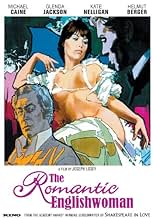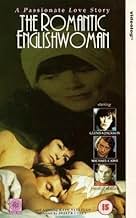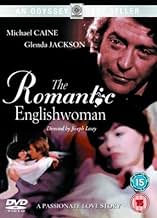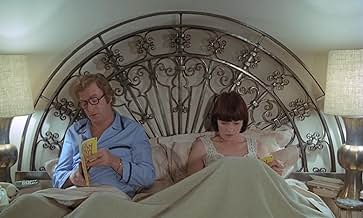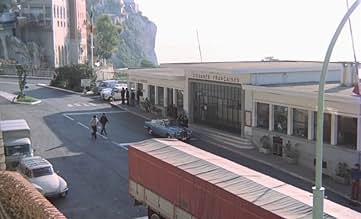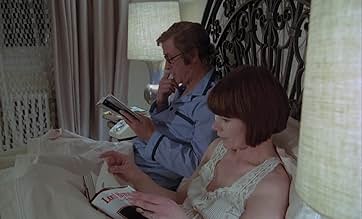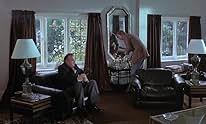CALIFICACIÓN DE IMDb
6.1/10
1.6 k
TU CALIFICACIÓN
Agrega una trama en tu idiomaA marriage crisis between a writer and his wife leads her to flee to Germany and eventually return with another man, through whom the writer is going to overcome his writer's block.A marriage crisis between a writer and his wife leads her to flee to Germany and eventually return with another man, through whom the writer is going to overcome his writer's block.A marriage crisis between a writer and his wife leads her to flee to Germany and eventually return with another man, through whom the writer is going to overcome his writer's block.
- Dirección
- Guionistas
- Elenco
Michael Lonsdale
- Swan
- (as Michel Lonsdale)
Béatrice Romand
- Catherine
- (as Beatrice Romand)
Reinhard Kolldehoff
- Herman
- (as Rene Kolldehoff)
Opiniones destacadas
Glenda Jackson's frustrated bourgeois housewife, having gone to the spa town of Baden-Baden for unspecified reasons, maybe or maybe doesn't have a brief affair with Helmut Berger's young gigolo. In town on a botched drug deal, Berger operates through a combination of what we might term freelancing: as a car or drug smuggler but, it seems, principally as a gigolo whose opening line is that he's a "poet". Meanwhile, back in British suburbia, Jackson's husband, writer Michael Caine abandons plans to work on a novel to begin a screenplay based on his jealous imaginings of his wife's Baden-Baden sojourn. When Berger telephones Caine to announce that he's an admirer of his work and turns up (literally) "for tea", the stakes are set for the triangle to play out, with the added drama in the final third of Berger's drug connections, among them the poker-faced, and sadly under-used, Michael Lonsdale, turning up in a kind of lugubrious pursuit.
During the 1960s and 70s, Joseph Losey reinvented himself from a filmmaker of social problem pictures and taut, gritty noirs, to an arthouse director, with mixed results. In some cases-notably his collaborations with Harold Pinter, 'Accident' and 'The Go-Between'-formal innovations-particularly Alain Resnais-style temporal ambiguity-were closely allied to a dissection of the British class system. In others, such as the camp classics 'Boom!' or 'Secret Ceremony', it's not clear exactly *what's* going on-and not necessarily in a good way. Essentially, what we watch is a set of variations on a theme, more or less successfully rendered. Take the use of flashbacks and flashforwards: longer or shorter inserts of scenes whose relation to the main narrative is not immediately revealed, used particularly good effect in the late '60s/early '70s Pinter collaborations 'Accident' and 'The Go-Between'. In 'The Romantic Englishwoman', the flashbacks/forwards centre on an incident that occurs near the start of the film: the moment Jackson and Berger take a lift together in their hotel and may or may not initiate a sexual relationship. This incident is a way to explore the boundaries between action and desire, and various real or imaginary pairings of the heterosexual couple and a third partner. What happened in the lift in Baden-Baden? From whose perspective do we see this?
As the film goes on, though, not much done is to expand these initially intriguing ideas. The film couldn't easily be called either a feminist or an anti-feminist film: Caine's obnoxious outburst at Jackson's friend, a visiting gossip columnist, for repeating feminist statements about female homemaking roles, is clearly absurd, yet, like Jeanne Mourea's Eve, Jackson's dreams of liberation from marriage can occur only through another man, offering no real possibility of sociability outside the heterosexual contract. We thus simultaneously watch the playing out of male jealousy and of Jackson's "romantic" desire for escape--the doomed template of much melodrama. Too often, though, the film simply *presents* this double-bind, offering little other perspective on what we already know. The flashback-flashforward structure insists on the claustrophobic way in which its characters play out pre-ordained social roles, yet it has little to say *about* such roles, apart from telling us that they exist. The result: a film that ultimately feels "cold", dead, an exercise in style.
During the 1960s and 70s, Joseph Losey reinvented himself from a filmmaker of social problem pictures and taut, gritty noirs, to an arthouse director, with mixed results. In some cases-notably his collaborations with Harold Pinter, 'Accident' and 'The Go-Between'-formal innovations-particularly Alain Resnais-style temporal ambiguity-were closely allied to a dissection of the British class system. In others, such as the camp classics 'Boom!' or 'Secret Ceremony', it's not clear exactly *what's* going on-and not necessarily in a good way. Essentially, what we watch is a set of variations on a theme, more or less successfully rendered. Take the use of flashbacks and flashforwards: longer or shorter inserts of scenes whose relation to the main narrative is not immediately revealed, used particularly good effect in the late '60s/early '70s Pinter collaborations 'Accident' and 'The Go-Between'. In 'The Romantic Englishwoman', the flashbacks/forwards centre on an incident that occurs near the start of the film: the moment Jackson and Berger take a lift together in their hotel and may or may not initiate a sexual relationship. This incident is a way to explore the boundaries between action and desire, and various real or imaginary pairings of the heterosexual couple and a third partner. What happened in the lift in Baden-Baden? From whose perspective do we see this?
As the film goes on, though, not much done is to expand these initially intriguing ideas. The film couldn't easily be called either a feminist or an anti-feminist film: Caine's obnoxious outburst at Jackson's friend, a visiting gossip columnist, for repeating feminist statements about female homemaking roles, is clearly absurd, yet, like Jeanne Mourea's Eve, Jackson's dreams of liberation from marriage can occur only through another man, offering no real possibility of sociability outside the heterosexual contract. We thus simultaneously watch the playing out of male jealousy and of Jackson's "romantic" desire for escape--the doomed template of much melodrama. Too often, though, the film simply *presents* this double-bind, offering little other perspective on what we already know. The flashback-flashforward structure insists on the claustrophobic way in which its characters play out pre-ordained social roles, yet it has little to say *about* such roles, apart from telling us that they exist. The result: a film that ultimately feels "cold", dead, an exercise in style.
It may be regarded as minor Losey but it's by no means dismissable and is set once again amongst the Upper Crust and the Hoi Polloi. "The Romantic Englishwoman" of the title is Glenda Jackson, (superb as always), married to novelist Michael Caine, (not at his best here). She's bored by the life she is leading which is no life at all really and he's got writer's block and has turned to writing for the cinema. It begins in Baden Baden where she's gone 'to find herself' and where she meets cocaine smuggling gigolo Helmut Berger, (much too prissy to be a convincing love interest). When she returns to England Berger follows her, landing on her doorstep where Caine welcomes him with open arms planning to make him a character in the film he is writing.
It was adapted by Thomas Wiseman and Tom Stoppard from a novel by Wiseman and there is nice streak of dark, and at times very funny, humour running through it though you would be hard pressed to call it a comedy. It wasn't well received when it came out and hasn't been much seen since. Ultimately it's Glenda's film reminding us just how good an actress she could be in a well-written role, here making mincemeat of her co-stars.
It was adapted by Thomas Wiseman and Tom Stoppard from a novel by Wiseman and there is nice streak of dark, and at times very funny, humour running through it though you would be hard pressed to call it a comedy. It wasn't well received when it came out and hasn't been much seen since. Ultimately it's Glenda's film reminding us just how good an actress she could be in a well-written role, here making mincemeat of her co-stars.
When you find "The Romantic Englishwoman" on IMDB, you might notice that the poster displayed (at least currently) makes the movie look like a porno picture! Jackson is wearing practically nothing and the pose is quite provocative. While there is a bit of nudity in the film and its plot about adultery, it's not a porno picture and I hate when unscrupulous studios try to mismarket movies this way. And, if you are looking for a skin flick, you definitely should look elsewhere.
When the story begins, Elizabeth Fielding (Glenda Jackson) is on holiday by herself at a German spa town. She wants some alone time as well as to 'discover' herself. Her husband is a writer who is at home with the kids and she either had an affair when she's there or wants to have one and imagines it (it's a bit vague due to the direction but it looked like she probably DID engage in an affair). She arrives back home and at first their reunion is very passionate, as the Fieldings make love on their front lawn...something most couples only do on occasion (perhaps every other week)! But the marriage returns to the tedium that apparently drove her to take this solo vacation in the first place. and, soon the man she had an affair with (or fantasized about) arrives for a visit and, oddly, Mr. Fielding's writers block seems to disappear.
Despite this film being about a troubled marriage and adultery, it's also amazingly sterile and, perhaps, dull. I agree with another reviewer who also felt this way. They thought having the film begin with the husband and wife apart and for such a big part of the movie further emphasized this sterility and made you care much less about the Fieldings or their marriage. Too often, performances are rather stodgy and the fireworks you might expect just aren't there most of the time. It is not another "Who's Afraid of Virginia Woolf?"...where a couple's relationship spirals out of control with vitriol and tons of emotion.
When the story begins, Elizabeth Fielding (Glenda Jackson) is on holiday by herself at a German spa town. She wants some alone time as well as to 'discover' herself. Her husband is a writer who is at home with the kids and she either had an affair when she's there or wants to have one and imagines it (it's a bit vague due to the direction but it looked like she probably DID engage in an affair). She arrives back home and at first their reunion is very passionate, as the Fieldings make love on their front lawn...something most couples only do on occasion (perhaps every other week)! But the marriage returns to the tedium that apparently drove her to take this solo vacation in the first place. and, soon the man she had an affair with (or fantasized about) arrives for a visit and, oddly, Mr. Fielding's writers block seems to disappear.
Despite this film being about a troubled marriage and adultery, it's also amazingly sterile and, perhaps, dull. I agree with another reviewer who also felt this way. They thought having the film begin with the husband and wife apart and for such a big part of the movie further emphasized this sterility and made you care much less about the Fieldings or their marriage. Too often, performances are rather stodgy and the fireworks you might expect just aren't there most of the time. It is not another "Who's Afraid of Virginia Woolf?"...where a couple's relationship spirals out of control with vitriol and tons of emotion.
Elizabeth Fielding (Glenda Jackson) returns from spa town Baden Baden, Germany where she met gigolo conman Thomas (Helmut Berger). Her husband Lewis (Michael Caine) is having writer's block and imagines all manners of things his wife is doing. Catherine is the hot nanny. Isabel (Kate Nelligan) is Elizabeth's gossiping friend who Lewis hates. Swan (Michael Lonsdale) is tracking Thomas. Then Thomas shows up at the Fielding home.
The couple never intrigued me. They have limited chemistry. Part of the problem is that the movie starts with them apart. They never really connect for me. Neither is the affair that compelling. There is a coldness to the movie. Maybe it's the intent to show a relationship in trouble. It does it in an uninteresting way.
The couple never intrigued me. They have limited chemistry. Part of the problem is that the movie starts with them apart. They never really connect for me. Neither is the affair that compelling. There is a coldness to the movie. Maybe it's the intent to show a relationship in trouble. It does it in an uninteresting way.
Spa towns seem to have an odd effect on film-makers. Alain Resnais' "Last year in Marienbad", set in the Czech spa town of that name, has a reputation for being bafflingly obscure, so much so that it won itself a place in Michael and Harry Medved's "Fifty Worst Films of All Time". And then there is Joseph Losey's "The Romantic Englishwoman", part of which is set in the German spa town of Baden Baden.
The plot concerns Elizabeth, the "romantic Englishwoman" of the title and the wife of a well-known novelist. While staying in Baden Baden Elizabeth has an affair with a young German named Thomas. Or does she? Is it possible that this "affair" was simply a fantasy on her part? Or does it only exist in the mind of her jealous husband Lewis? Thomas, an admirer of Lewis' work, later comes to stay with Lewis and Elizabeth at their home in England, where Lewis makes him surprisingly welcome for a man who is (or whom he believes to be) his wife's lover. There is also a sub-plot about Thomas' criminal associates, led by a man named Swan, who are pursuing him across Europe, but the exact details remain vague.
There is an adage that one should never judge a book by its cover, and the cinematic equivalent would probably be "don't judge a film by the big names in its title sequence". Even if you have admired the other work of those names. Michael Caine (now Sir Michael) is one of the cinema's greatest stars, appearing in some of the best British films of the sixties, seventies and eighties such as "Alfie", "Get Carter" and "Educating Rita". Glenda Jackson is today best known as a Labour politician, but was a fine actress in her youth. Scriptwriter Tom Stoppard is perhaps Britain's greatest living playwright. Losey was best known to me as the director of "The Go-Between", one of the major British films of the early seventies and one of the films which started the "heritage cinema" movement.
Unfortunately, all this assembled talent does not make for a good film. "The Romantic Englishwoman" goes to show that baffling obscurity was not a monopoly of the Nouvelle Vague and that British art-house film-makers could be just as infuriatingly obscure as their French counterparts. (Losey was American by birth, but I count him as an honorary Briton. He was forced to leave Hollywood during the McCarthy era because of his left-wing sympathies and thereafter worked mostly in Britain). I would not quite count this among my all-time fifty worst films, but it is nevertheless a dull and confusing one which not only lacks a clear storyline but also lacks any perceptible point. There are some films where ambiguity can be a positive virtue rather than a fault, but this is not one of them. 4/10
The plot concerns Elizabeth, the "romantic Englishwoman" of the title and the wife of a well-known novelist. While staying in Baden Baden Elizabeth has an affair with a young German named Thomas. Or does she? Is it possible that this "affair" was simply a fantasy on her part? Or does it only exist in the mind of her jealous husband Lewis? Thomas, an admirer of Lewis' work, later comes to stay with Lewis and Elizabeth at their home in England, where Lewis makes him surprisingly welcome for a man who is (or whom he believes to be) his wife's lover. There is also a sub-plot about Thomas' criminal associates, led by a man named Swan, who are pursuing him across Europe, but the exact details remain vague.
There is an adage that one should never judge a book by its cover, and the cinematic equivalent would probably be "don't judge a film by the big names in its title sequence". Even if you have admired the other work of those names. Michael Caine (now Sir Michael) is one of the cinema's greatest stars, appearing in some of the best British films of the sixties, seventies and eighties such as "Alfie", "Get Carter" and "Educating Rita". Glenda Jackson is today best known as a Labour politician, but was a fine actress in her youth. Scriptwriter Tom Stoppard is perhaps Britain's greatest living playwright. Losey was best known to me as the director of "The Go-Between", one of the major British films of the early seventies and one of the films which started the "heritage cinema" movement.
Unfortunately, all this assembled talent does not make for a good film. "The Romantic Englishwoman" goes to show that baffling obscurity was not a monopoly of the Nouvelle Vague and that British art-house film-makers could be just as infuriatingly obscure as their French counterparts. (Losey was American by birth, but I count him as an honorary Briton. He was forced to leave Hollywood during the McCarthy era because of his left-wing sympathies and thereafter worked mostly in Britain). I would not quite count this among my all-time fifty worst films, but it is nevertheless a dull and confusing one which not only lacks a clear storyline but also lacks any perceptible point. There are some films where ambiguity can be a positive virtue rather than a fault, but this is not one of them. 4/10
¿Sabías que…?
- TriviaSir Dirk Bogarde turned down the role of Lewis Fielding.
- ErroresWhen the Glenda Jackson character first arrives back from abroad and wanders around her home, the camera crew can be seen reflected in the glass of a picture on the wall.
- ConexionesFeatured in Premio Donostia a Michael Caine (2000)
Selecciones populares
Inicia sesión para calificar y agrega a la lista de videos para obtener recomendaciones personalizadas
- How long is The Romantic Englishwoman?Con tecnología de Alexa
Detalles
- Fecha de lanzamiento
- Países de origen
- Idiomas
- También se conoce como
- Die romantische Engländerin
- Locaciones de filmación
- Productoras
- Ver más créditos de la compañía en IMDbPro
Taquilla
- Presupuesto
- USD 1,200,000 (estimado)
- Tiempo de ejecución
- 1h 56min(116 min)
- Mezcla de sonido
- Relación de aspecto
- 1.85 : 1
Contribuir a esta página
Sugiere una edición o agrega el contenido que falta



